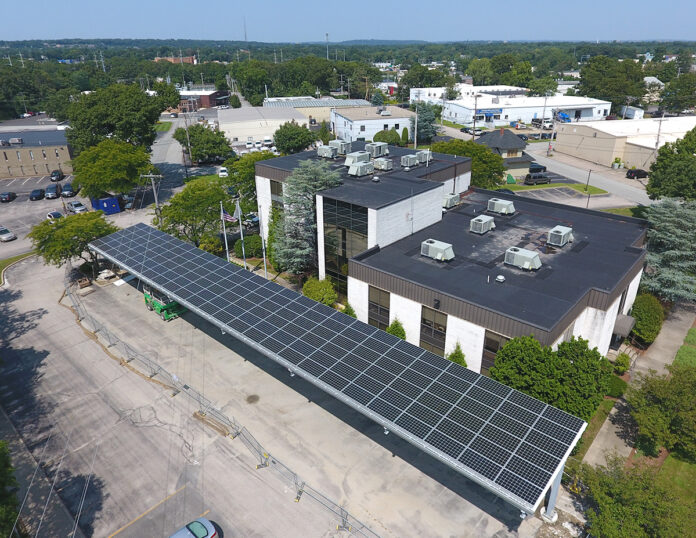
PROVIDENCE – After a two-year test run, National Grid has nixed a program that gives developers extra money to build solar canopies on parking lots.
And some environmental groups aren’t happy.
The 2022 Renewable Energy Growth Program approved by the R.I. Public Utilities Commission did not include the solar carport adder in its set of long-term tariffs paid to customers who sell their renewable energy to National Grid. This effectively ends the pilot solar parking lot program that began in 2020 in an attempt to shift projects away from forest and farmland.
The extra money for parking lot solar arrays already drew scrutiny, with commission members questioning the returns on investment last year as well as its benefits to ratepayers other than the property owners where projects were built.
Analysis submitted with this year’s program documents backed that up, showing the costs for National Grid – and in turn, ratepayers – to continue the program exceeded the benefits. In some cases, National Grid would have to increase its financial incentive by up to 140% to offset the prices being paid by developers, according to its analysis.
The commission’s unanimous vote on Wednesday did not include any discussion of the carport program. But environmental advocates had plenty to say.
Sean Burke, policy manager for the Northeast Clean Energy Council, called the decision a “missed opportunity” to help meet the state’s ambitious renewable energy mandates.
It also sends a less-than-welcoming message to solar developers, especially compared with Massachusetts, which has a strong parking lot solar array incentive program, Burke said.
“It’s going to prevent developers from siting in Rhode Island until they understand that Rhode Island is committed to siting on parking lots and other preferred locations,” Burke said.
Meanwhile, the conflict between cities and towns and the developers who want to clear forest and farmland for solar projects is bound to ramp up, said Sue Anderbois, the climate and energy program manager for The Nature Conservancy.
“There is an urgent need to address the siting and environmental conflicts associated with large net metered projects,” Anderbois wrote in a joint letter to the commission with Priscilla de la Cruz of Audubon Society of Rhode Island. Unlike those controversial projects, parking lot solar arrays avoid the “unintended consequence of triggering significant clearing of Rhode Island forests,” Anderbois said in the letter.
But building solar canopies on parking lots rather than farmland costs more money, which is why most developers choose the latter. The extra financial incentive in the solar carport program helped bridge that financial gap.
While the parking lot solar incentive is out for this year, legislation introduced in the R.I. House seeks to bring it back, not just as a test program but a permanent one.
The bill, sponsored by R.I. Rep. June Speakman, D-Warren, also prevents protected conservation areas, such as 250-acre-swaths of forestland, from getting any kind of financial incentives under the program. Additionally, it makes project location, “including climate resilience and conservation benefits,” a factor in setting the tariff price a renewable energy project can receive. Currently, location is not one of the factors used to calculate prices.
The bill has been referred to the House Corporations Committee but not yet scheduled for a hearing. Anderbois was hopeful it would pass, given what is at stake.
“We know the climate crisis is urgent and we know we need to build out our renewable energy projects,” she said. “But we also need to think about where we’re putting them.”
The R.I. Office of Energy Resources, which recommended the solar carport adder previously, said in an emailed response to request for comments that it “remains committed to working with agencies and stakeholders on solar siting subjects and other opportunities within the state’s renewable energy programs.”
The 2022 Renewable Energy Growth Program approved Wednesday also sets the ceiling prices for renewable energy projects, which are grouped based on type of energy and size. The 2022 program aims to incentivize 61-megawatts of “nameplate” of maximum renewable energy through various sizes and types of energy projects.
The extra payment for parking lot solar canopies will still be available for the six projects that already qualified for it in previous years.
Nancy Lavin is a PBN staff writer. You may reach her at Lavin@PBN.com. Follow her on Twitter at @NancyKLavin.












